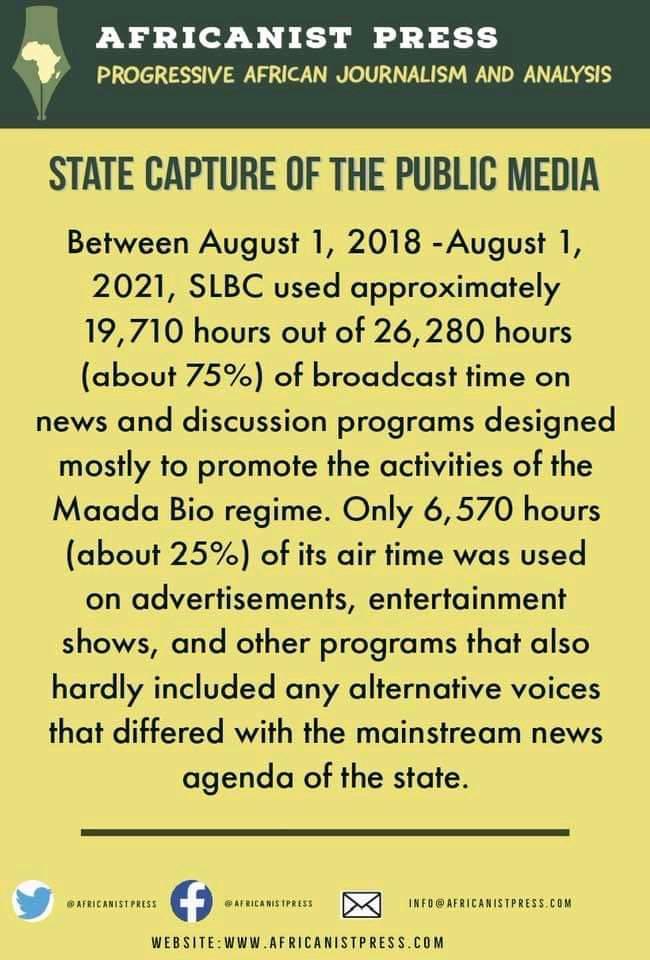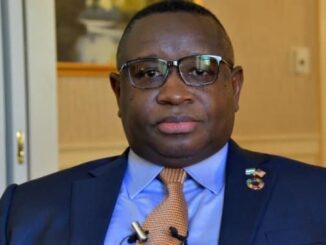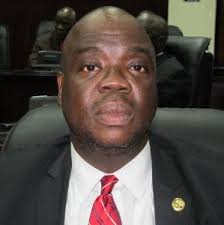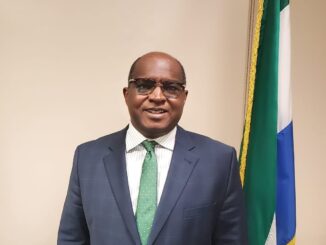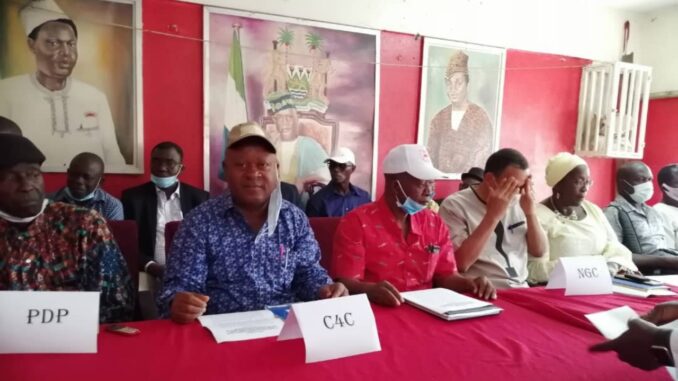
The Consortium of Progressive Political Parties ( COPPP) , which is a coalition of opposition parties in Sierra Leone, have protested that democracy is under threat in Sierra Leone.
COPP released a statement in Freetown yesterday in which they made serious allegations against the Sierra Leone People’s Party ( SLPP ) Government , complaining that the SLPP “in the past three years has been systematically closing the democratic space, marginalizing and destroying any real opposition, recklessly committing human rights abuses and installing a climate of fear and terror among the people, while at the same time playing to the gallery of the international community with one or two governance tokens such as the decriminalization of the Libel laws and the abolition of the death penalty.”
HERE IS THE FULL STATEMENT
Democracy under serious threat in Sierra Leone
Unfortunately, as the citizens and our development partners can bear witness, this Government in the past three years has been systematically closing the democratic space, marginalizing and destroying any real opposition, recklessly committing human rights abuses and installing a climate of fear and terror among the people, while at the same time playing to the gallery of the international community with one or two governance tokens such as the decriminalization of the Libel laws and the abolition of the death penalty.
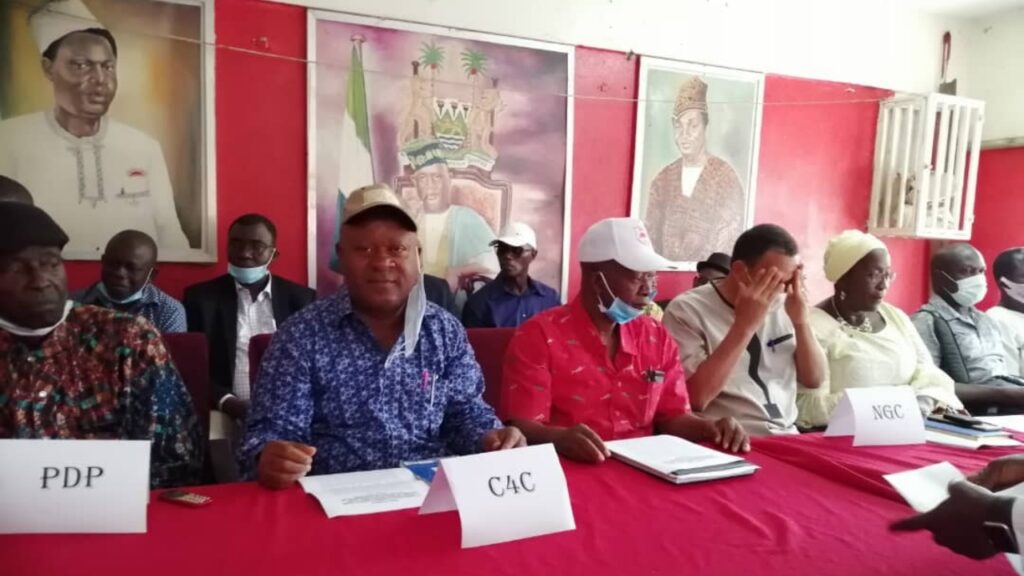
Meanwhile this Government continues to reduce the Constitution to triviality, the Legislature and the Judiciary to a laughingstock and the Treasury to a piggy bank for reckless spending on projects and schemes that bear very little relation to the desperate condition of the majority of our people.
COPPP was formed because all our efforts as individual opposition political parties made previously to engage the Government on specific burning issues were either rebuffed with contempt or simply ignored. We therefore believe that by coming together as responsible opposition parties and an integral part of the governance system, we stand a better chance of being respected by the Government and of being heard by the citizenry and those who are pouring their taxpayers’ money into the Sierra Leone project.
History of APPA
In this regard, our consortium would like to bring to the attention of the general public and the development partners the truth about the so-called “ALL Political Parties Association”, commonly known as APPA. Historically, this association came into being in the 1990s during the regime of the National Provisional Ruling Council (NPRC), a military junta headed then by young military officers including the gentleman who has become our current President of Sierra Leone, Retired Brigadier General Julius Maada Bio. At the time, political parties were struggling for the restoration of democratic rule and APPA was a useful platform for united action in defense of democracy.
APPA no longer representative
Unfortunately, APPA has completely lost focus as a responsible forum for political engagement. After many years of manipulation by one individual at the PPRC who incidentally has recently been rewarded with elevation and promotion to another State Institution, APPA became a complete stooge of the Government, funded and housed within the PPRC.
Thirteen political parties therefore left APPA but the remaining four continue to posture as representatives of all political parties. Rather than being representatives of the people, the remnant elements of the diminished APPA have become the predictable voice of Government and a boring echo chamber of congratulations and praises to His Excellency and his Government. This is not serious for democracy and COPPP therefore publicly denounces this tendency by some political and civil society organizations of systematically seeking inducement and the good graces of the Government in power instead of holding them accountable.
Consequences of low capacity and lack of resources on political parties
Admittedly, at the heart of this problem is lack of resources and low capacity of most political parties. The laws governing the formation and administration of political parties impose very difficult prescriptions that favour only the two old parties that have been able to develop solid structures and operational capabilities throughout the country over the years. New parties are required at the outset to have the same capacity and structures throughout the country like the established ones; they are even required to submit audited accounts to the Government even though the Political Parties Act imposes strict restrictions on fund raising and the State provides no financial support to them.
Consequently, weakened at birth, new political parties either quickly die out or are forced to revert to unwholesome coping mechanisms in order to survive. This includes trading support for Government’s policies and actions for material and financial gains. There is a recording of the current Chairman of APPA boasting about his skills in obtaining money from Governments in power by singing their praises and supporting their policies in public and the media.
PPRC still wrongly promoting APPA as representing all parties
This is one of the sad realities of politics in Sierra Leone today. Surprisingly, even though most political parties have written to the PPRC to inform them that they are not members of APPA and the membership of APPA has dramatically dwindled to only four, the Registry of the PPRC has been giving them the podium and projecting them as representing the views of ALL political parties! They do not! APPA is not ALL political parties. It is just about four parties out of seventeen and they are easy to recognize by their letters of support to Government when appointments are made or when Government makes controversial decisions.
The appointment of Zainab Morseray as NEC Commissioner, Western Area
Recently for instance, Government appointed the former Acting Registrar of the PPRC to the critical position of Western Area Commissioner at the National Electoral Commission. The Constitution of Sierra Leone clearly stipulates in section 32(3) that ALL registered political parties must be consulted by the President before such appointments are made.
However, the Secretary to the President wrote to political parties, not to consult (i.e. request their views, opinions about the background and suitability of the would-be appointee) but just to inform us that the appointment had already been made at the pleasure of His Excellency. The case of Mrs. Zainab Morseray is particularly significant in terms of the need for consultations before appointment is made.
We would like to assume that the Presidency is not aware that their appointee is currently the subject of investigation by the Anti-Corruption Commission (ACC) for financial malpractices related to the use of funds donated by ECOWAS and other actions taken during the period when all Commissions in the country were dissolved. The ACC has given no notification yet of the conclusion of their investigation and it is unimaginable what the repercussions of her appointment will be if the sensitive duty of the conduct of public elections is placed in the hands of someone whose integrity is under such scrutiny.
Travels and the security of State officials
Finally, we wish to register our concern and amazement at the casual way in which top Government officials through their travel habits have been exposing themselves to risks that may have national security implications. It may be recalled that it was at the height of the civil crisis in Lebanon that our President and First Lady made the now famous visit to that country, the purpose of which is still clouded in mystery due to the conflicting official reasons given at the time (State official or medical or honeymoon).
That visit can be likened to the President of any country ignoring the security implications and choosing to visit Sierra Leone in the middle of the events of January 6, 1999. Events around the world are showing that it is the entire country that suffers if anything bad befalls a President, especially if it happens away from home.
We have also learnt that the Inspector General of Police is currently in Lebanon at a time when foreign Governments have declared the situation there as “unpredictable” with risks of “civil protests, heightened sectarian tensions, sporadic terror attacks such as a 2019 attack against security forces in Tripoli, and security force counter-terror operations…” What is so important in Lebanon that senior State officials feel compelled to go there when bullets may be flying, risking their lives, the lives of their colleagues and the stability of the State?
Conclusion
In the light of the issues raised above we at COPPP hereby wish to state the following:
Most of the political parties that constituted APPA are no longer members of that association. Therefore, the statements by APPA and their position on issues should not be considered as representing the views of the majority of political parties in Sierra Leone.
COPPP is an association of political parties like APPA and must now be given due recognition by the PPRC.
We demand that the laws governing political parties be reviewed and revised so that parties are treated in a manner that is comparable to other public institutions.
We demand that the State implements an equitable system of support to the operational capacity of all registered political parties.
We recommend that operating offices in all regions of the country should be desirable but not a necessary requirement for the registration and recognition of political parties; parties that do not have foothold in every region but have a bias for and capacity to defend specific issues of national interest such as clean energy, environmental protection and women’s participation should have equal rights to operate as others.
We request that the Anti-Corruption Commission gives an update on their investigation into the allegations made against Mrs. Zainab Morseray, former acting Registrar of the PPRC, and that until that investigation is concluded her appointment to the position of NEC Commissioner or the process of approval thereof be suspended forthwith.
We recommend that travels of top State officials abroad be curtailed as they cost too much money at a time when our country is cash strapped and there may be high risks also that in these travels, we could easily lose the precious lives of our leaders. “ END
